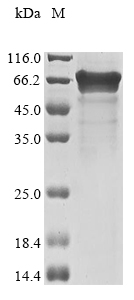The mature human YTHDF1 protein-encoding gene (2-559aa) is tagged at the N-terminus with a 6xHis sequence to produce the target gene. This gene undergoes PCR amplification and is then inserted into expression vectors for recombinant plasmid construction. These plasmids are transfected into yeast cells, which are induced for protein expression in culture. The culture supernatant is harvested and purified using affinity chromatography, obtaining the recombinant human YTHDF1 protein with a purity level above 85%, verified by SDS-PAGE.
The YTHDF1 protein is a critical reader of N6-methyladenosine (m6A) modifications on mRNA, playing a significant role in the regulation of gene expression, particularly in the context of cancer biology. YTHDF1 is primarily located in the cytoplasm and is known to facilitate the translation of m6A-modified mRNAs, thereby influencing various cellular processes including proliferation, differentiation, and tumorigenesis [1][2][3].
YTHDF1 operates by binding to m6A sites on mRNA, which enhances the translation efficiency of these transcripts. This function is particularly important in cancer, where YTHDF1 has been shown to promote the expression of oncogenes and facilitate processes such as epithelial-mesenchymal transition (EMT), a key event in cancer metastasis [4][5][3]. Studies have demonstrated that YTHDF1 enhances the translation of specific mRNAs such as ARHGEF2 and YAP, which are involved in RhoA signaling and drug resistance, respectively [2][6]. Furthermore, YTHDF1's interaction with the translation machinery, including components like eIF4G and eIF3, underscores its role in cap-dependent translation initiation [7].
YTHDF1 has also been implicated in the degradation of mRNA, suggesting a dual role in both promoting and regulating mRNA stability [8]. This regulatory capacity is essential for maintaining cellular homeostasis and responding to environmental cues, such as hypoxia, which can influence YTHDF1 expression and activity [9]. Moreover, YTHDF1 has been linked to immune evasion in tumors, as it can promote the degradation of MHC-I molecules, thereby reducing the immune system's ability to recognize and attack cancer cells [3].
References:
[1] Y. Bao, J. Zhai, H. Chen, C. Wong, C. Liang, Y. Dinget al., Targeting m6a reader ythdf1 augments antitumour immunity and boosts anti-pd-1 efficacy in colorectal cancer, Gut, vol. 72, no. 8, p. 1497-1509, 2023. https://doi.org/10.1136/gutjnl-2022-328845
[2] S. Wang, S. Gao, Y. Zeng, L. Zhu, Y. Mo, C. Wonget al., N6-methyladenosine reader ythdf1 promotes arhgef2 translation and rhoa signaling in colorectal cancer, Gastroenterology, vol. 162, no. 4, p. 1183-1196, 2022. https://doi.org/10.1053/j.gastro.2021.12.269
[3] W. Lin, L. Chen, H. Zhang, X. Qiu, Q. Huang, F. Wanet al., Tumor-intrinsic ythdf1 drives immune evasion and resistance to immune checkpoint inhibitors via promoting mhc-i degradation, Nature Communications, vol. 14, no. 1, 2023. https://doi.org/10.1038/s41467-022-35710-7
[4] Y. Bai, C. Yang, R. Wu, L. Huang, S. Song, W. Liet al., Ythdf1 regulates tumorigenicity and cancer stem cell-like activity in human colorectal carcinoma, Frontiers in Oncology, vol. 9, 2019. https://doi.org/10.3389/fonc.2019.00332
[5] X. Luo, M. Cao, F. Gao, & X. He, Ythdf1 promotes hepatocellular carcinoma progression via activating pi3k/akt/mtor signaling pathway and inducing epithelial-mesenchymal transition, Experimental Hematology and Oncology, vol. 10, no. 1, 2021. https://doi.org/10.1186/s40164-021-00227-0
[6] J. Xing, Y. He, K. Wang, P. Wan, & X. Zhai, Involvement of ythdf1 in renal fibrosis progression via up‐regulating yap, The Faseb Journal, vol. 36, no. 2, 2022. https://doi.org/10.1096/fj.202100172rr
[7] B. Shi, W. Liu, K. Yang, G. Jiang, & H. Wang, The role, mechanism, and application of rna methyltransferase mettl14 in gastrointestinal cancer, Molecular Cancer, vol. 21, no. 1, 2022. https://doi.org/10.1186/s12943-022-01634-5
[8] J. Li, K. Chen, X. Dong, Y. Xu, Q. Sun, H. Wanget al., Ythdf1 promotes mrna degradation via ythdf1‐ago2 interaction and phase separation, Cell Proliferation, vol. 55, no. 1, 2021. https://doi.org/10.1111/cpr.13157
[9] Y. Shi, S. Fan, M. Wu, Z. Zuo, X. Li, L. Jianget al., Ythdf1 links hypoxia adaptation and non-small cell lung cancer progression, Nature Communications, vol. 10, no. 1, 2019. https://doi.org/10.1038/s41467-019-12801-6




